| Brazil Nutters! |
|
 |
Jockey Slut Volume 2, Number 6 February / March 1997 Page: 42 |
NINE YARS AND SEVEN ALBUMS INTO THEIR CAREER THE BAND THAT LITERALLY INVENTED 'LIVE' DANCE MUSIC MAY NOT BE THE TRENDIEST NAME TO DROP BUT THEY'RE STILL KNOCKING OUT HIT TUNES AND GETTING BOOKED TO PLAY ON THE SAME BILL AS THE LIKES OF ISAAC HAYES AND BJORK... IN BRAZIL! RICHARD HECTOR-JONES WENT ALONG TO EXPERIENCE THE 808 LIFESTYLE.
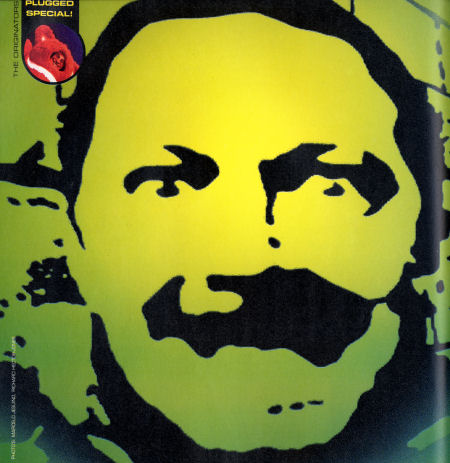 A Jazz festival in Brazil. For most bands life can't get much sweeter than that. As pioneers of talking techno live 808 State seem to take it all in their stride, curiously unaffected by the kudos, the mystery, the experience of hopping off to a South American country to play their music. They are seasoned travellers much like those people who fall asleep even before the plane has taken off for its immeasurably long flight. Even the uncertainty of whether or not they actually have albums out bothers them little. That 808 are no strangers to foreign gigs goes some way to explain their calm. That it's only 5:30am at Manchester airport and no one's had a whiff of coffee yet is probably another reason. 808 State have played all around the world in their 9 year lifespan, all the usual places, and a lot of the unusual places. From Japan (four times so far, a fifth in February) to a residency in Hawaii, from America's west coast to east coast, though Brazil is the first time they're set to touch down on South American soil. All in all a curious thing for band that have been received somewhat quietly by the British on the release of their last album 'Don Solaris', a defiantly idiosyncratic album that once again confounds expectations of what 808 actually do. 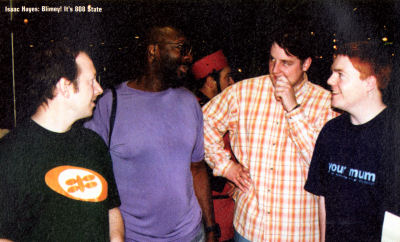 The 'Free Jazz Festival' takes place in Rio De Janeiro and Sao Paulo over the course of a week. 'Free' is the name of the cigarette company in Brazil thankfully - a week of free jazz could've only lead to a lonely suicide in a foreign hotel room. With a gig scheduled for each location it would be interesting to see the response from a more industrial area (Sao Paulo) and the more affluent Rio. As it turned out there's no such thing as an affluent jazz gig in Brazil. Other people scheduled to play include Isaac Hayes (who was stalked in an elaborate set piece plan worthy of Hitchcock for a photo opportunity), Herbie Hancock, George Clinton, Bjork, and a host of jazzniks firmly established on the global network. Quite a line up and not inconsiderably at odds with 808 State. The most terrifying event of the whole week is not being held up at gun point by the military police for an impromptu street corner drug search (though a shotgun in the back has its drawbacks) but being in a lift on the 23rd floor of a hotel that as three enormours members of the P-Funk All Stars get in, setting off overloaded alarms all around the hotel, nearly sealing our fates at one million miles per hour going down. 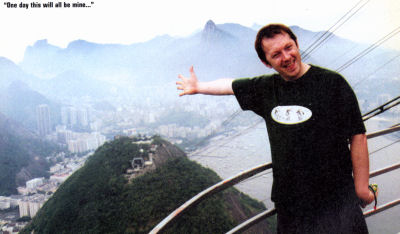 King of the analogue machines, Graham Massey, isn't around for that pleasure. He's off first thing in the morning around Sao Paulo looking for ever more musical oddities to cram into his house back home. Though more recently this seems to have died down a tad because "I've got everything I need now". Even so he still comes back grinning manically later that day having found a huge Brazilian made fuzz box/wah-wah peddle combination. "I've got one of these already," he laughs, "but this one's beige!" The Brazilian techno scene is small but clued up. No musical subculture could ever take on the might of heavy metal in Brazil. In fact the same day as 808 played Sao Paulo to 3,500, AC/DC were rockin' the packed 52,000 capacity sports arena. Nevertheless after the gig a group of techno fans made their way through to the band inviting all of us to the best underground club, just outside the city, promising a night of Detroit sounds. Unfortunately, because it was in a rough part of town we were strongly advised not to go. In a strange new country advice is one of the few things worth following to the letter. Still, the minority are really into their techno over there, particularly one specific nutter in a Red Planet T-shirt who managed to gate crash every press conference 808 did and ask interminable questions about Underground Resistance, Jeff Mills, and all manner of technology. Sound familiar? At one point the translator became so incensed that she actually made her way over to him and smacked him squarely on the nose with her microphone, all on live national TV. Justice. Well, almost, because 'Factory Records obsessed man' has taken over asking all form of finicky questions about Crispy Ambulance, The Royal Family and The Poor and all manner of obscure long lost Manchester bands. It's altogether quite a surreal experience as the group are forced to take on the role of cultural ambassadors for all things English. Next up, thimbles of the nineteenth century. 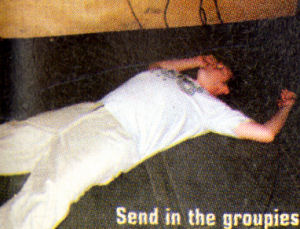 "Everyone else gets groupies," groans Massey. "We just get boffins who want to talk about midi leads and obscure white labels." While on the subject of fans, 808's next single 'Lopez' (with guest singer James Dean Bradfield from the Manic Street Preachers and cunningly remixed by 'next big thing' types the Propellerheads) is out at the end of January. By a bizarre twist of fate Lopez also happens to be the surname of the obsessed fan of Bjork's who blew his head off due to some deranged twist of logic. A detail that's given the band more than a few thoughts towards retitling. The gigs themselves are both enormous successes paving the way for Bjork's set, fortuitous programming for both bands and particularly apt as Massey co-wrote her 'Army of Me' hit, percussion from 'live' 808 member Colin Seddon whipping the crowd up to a samba frenzy that puts British audiences to a sexless crimplene shame. A heady mix of old and new material from the seductive 'Azura' (with live guest vocals from Tricky and Spacer collaborator Alison Goldfrapp) to the anthemic 'Pacific State' half computer/half live as Graham Massey pulls out progressively more bizarre old instruments with which to make crazed sound with. "It's weird taking Brazilian coals to Brazil," he says afterwards cryptically. "It makes you a hell of a lot more self conscious on stage. But it was definitely what made the night kick off, and it goes to show how well Brazilian music sits with our dance culture. Though it's never been an ambition of mine to play here it becomes more real to me to play in a country where you're not a part of the culture." 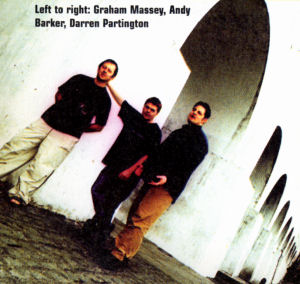 Being part of British culture is something that 808 State have had to come to terms with for better or for worse. As a dance band on the verge of starting on their eighth album they are pioneers. Pioneers in that no other dance act has been there before them. And from that point of view there's no map of the pitfalls. You have to find them out for yourselves. Finding a way of marketing a music that bears no resemblance to the rave scene from which they sprung is not an easy task. It's not easy getting people to listen to your music at the best of times but with the weight of history on your shoulders too it could become too much. If you let it. "It's an awkward thing," confirms Graham. "Once we were very marketable. We did 'NewBuild', an acid house album, right in the middle of acid house. Simple! Then we decided to spread it out a bit and make broadening out part of our identity and we did so with '90' and 'ex:el'. By the time we reached 'Don Solaris' we're not even thinking about marketing any more. So having a history is both a lucky position to be in and a dirty great weight around your neck. But I've got to see it from the perspective of what will the Chemical Brothers' eighth album sound like because that's the point we're at now." "We could map out our careers and do the same old shit," he continues, " but the politics of making music comes from a completely different era to me. Derrick May's not made a new record for years. That's what makes someone a legend. It's good as being dead. I'm not taking anything away from him but from a fan's point of view if it's not moving and it's cast in stone then everything's so much easier." "I've always admired the 'body of work' idea," Graham continues, "because I've always admired people who've done it, so that's the path I want to follow. Take Miles Davis, the idea of coming from somewhere and changing and mutating to arrive at something completely fresh is a central idea to me and it's not a very popular idea especially in the dance industry. In fact you could look at it as bering quite destructive but it's a bet, a gamble." But Miles Davis didn't consciously work towards a 'body of work'. "No, but there are points where he's reacting to what's around him. He had to kick the jazz establishment in the teeth repeatedly to stay afloat. Whereas people like Dizzy Gillespie made a living out of not changing and just staying at the same level. I couldn't do that." "Most dance bands have got their market and they're going to stick with it," says Darren. "They think if they go too far off the dial people are going to forget about them. But I think there are enough people out there, who've been on the scene for a while, who want something a bit different. I know I do." A little sophistication? "Yeah, but that can sound a bit poncey. What I mean is when you get one through the goalposts, something that's true to you, then you don't mind spending two years touring round the States with it because it's genuine. I just couldn't do it any other way."  As a live experience 808 State throw themselves into the show in a way that sets them apart from, for example, Orbital who are their closest contemporaries in longevity. From Darren's old school hip hop scratching finesse (he's one half of The Spin Masters with third 808 member Andy Barker) to Massey's sonic improvisations they manage to make live dance music an experience that translates visually, and not simply due to lighting; a skill most contemporaries are only just starting to pick up. "I don't think being live is the crucial thing," says Graham. "More important is the need for a programme to your set. The idea of one thing going on for an hour gets on my wick. You need dynamics and that is the one thing we address. It's an old fashioned idea but it's one that we like. It's become an 808 philosophy both live and on album." Having said that when asked about the most bizarre gig they've ever played Andy will cite a small club in Italy a few years back. "I remember it all too well," he grins, "because the power went down six times but still the promoter stood at the side of the stage shouting 'You're not coming off 'til you f inish your set!'." That's the time liveness beats computer technology. "Touring America changed our view of playing live a lot," continues Andy. "One night we'd play 300 capacity halls then the next night we'd be doing a 15,000 capacity rave in LA. On tour with New Order the smallest gig we did was 20,000." 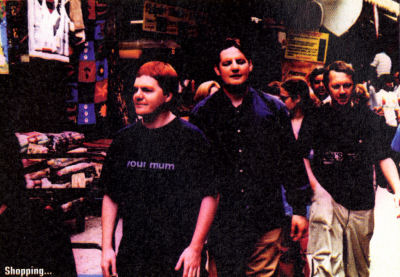 "When you're playing somewhere like Tallahassee," adds Graham, "all those crucial things like what equipment you're using don't matter a jot. It's what you're doing up there that counts. We went through the knob-twiddling period really early on and we did an enormous amount of disastrous gigs. When you've died so many times you realise that it's the human element of the show that's important and actually giving something. Touring around America for ages takes the self importance out of it all and makes you realise that you're just another aspect of the whole entertainment tradition." After their last tour of America (for three and a half months) a couple of years back they were invited to take up a residency as a house band in Hawaii; a curious addition to any band's CV. "That was the best place we ever played," remembers Massey. "After touring solidly for so long the music had hit a good level because we'd loosened up a lot with it. Aside from that it was a dream place to go to. That and the fact that we didn't have to dismantle all the equipment at the end of each night. "Hawaii is just a great place," he continues. "While we were there we saw Cyprus Hill and Naughty By Nature at a huge hip hop jam in a stadium. There's enough teenagers over there to fill a place like that for hip hop alone. They know how to have a good time over there."  But here and now is Brazil. Miles away from the politics of musical Britain 808 State have pulled off two rather splendid live and lively gigs. In fact, in Rio the audience were getting so excitable prior to the show that the promoter, somewhat strangely, decided to turn the music off calming down the crowd by giving them nothing to dance to. An odd action towards a people so much more apt to let go of themselves when they step out for a night. But for two nights in one of the most beautiful countries in the world 808 State have proven that live dance music has the capacity to be as vital and as fun to watch as any rock'n'roll contenders |
|